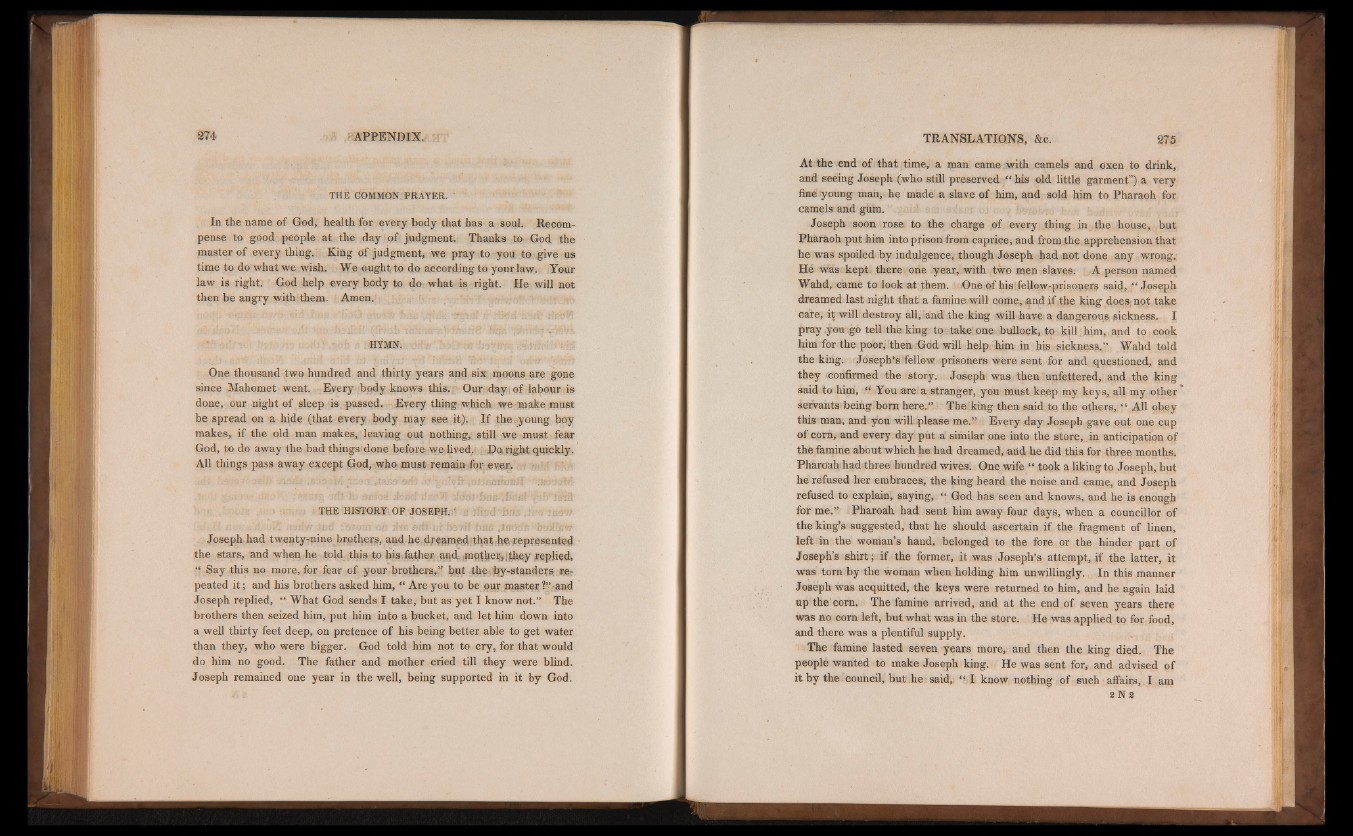
THE COMMON PRAYER. '
la the name of God, health for every body that has a soul. Recompense
to good people at the day of judgment. Thanks to God the
master of every thing. King qf judgment, we pray to you to give us
time to do what we wish. We ought to do according to your law. Your
law is right. God help every body to do what is right. He will not
then be angry with them. Amen.
HYMN;
One thousand two hundred and thirty years and six moons are gone
since Mahomet went. Every body knows this. Our day . of labour is
done, our night of sleep is passed. Every thing which we 'make must
be spread on a hide (that every body may see it). If the,young boy
makes, if the old man makes, leaving out nothing, still we must fear
God, to do away the bad things done before we.lived,; D aright quickly.
All things pass away except God, who must remain for ever.
THE HISTORY OF JOSEPH. ‘ ■ ■ .' .
Joseph had twenty-nine brothers, and he dreamed that he represented
the stars, and when he told this to his. father andm ofbe%i they replied,
“ Say this no more, for fear of your brothers,” but the toy-stauders repeated
it; and his brothers asked him, “ Are you to be our master?” and
Joseph replied, “ What God sends I take, but as yet I know not.” The
brothers then seized him, put him into a bucket, and let him down into
a well thirty feet deep, on pretence of his being better able to get water
than they, who were bigger. God told him not to cry, for that would
do him no good. The father and mother cried till they were blind.
Joseph remained one year in the well, being supported in it by God.
At the end of that time, a man came with camels and oxen to drink,
and seeing Joseph (who still preserved “ his old little garment”) a very
fine young man, he made a slave of him, and sold him to Pharaoh for
camels and gum.
Joseph soon rose to the charge of every thing in the house, but
Pharaoh put him into prison from caprice, and from the apprehension that
he was spoiled by indulgence; though Joseph had not done any wrong.
He was kept there one year, with two men slaves. A person named
Wahd, came to look at them. .One of his fellow-prisopers said ,“ Joseph
dreamed last night that a famine will come, and if the king does not take
care, it will destroy all, and the king will havCi a dangerous sickness. I
pray you go tell the king to take one bullock, to kill him, and to cook
him for the poor, then ;God will help, him in his sickness.” Wahd told
the king, Joseph’s fellow prisoners were sent for and questioned, and
they ‘confirmed the story. Joseph was then unfettered, and the king
said to him, “ You are a stranger, you must keep my keys, all my other
servants being born here.” The/king then said to the others,:“ All obey
this man, and you will please me.” Every day Joseph gave out one cup
of corn, and every day put a similar one into the store, in anticipation of
the famine about which he had dreamed, and he did this for three months.
Pharoah had three hundred wives. One wife “ took a liking to Joseph, but
he refused her embraces, the king heard the noise and came, and Joseph
refused to explain, saying, “ God has seen and knows, and he is enough
for me.” Pbaroah had sent him away four days, when a councillor of
the king's suggested, that he should ascertain if the fragment of linen,
left in the woman’s hand, belonged to the fore or the hinder part of
Joseph’s shirt; if the former, it was Joseph’s attempt, if the latter, it
was torn by the woman when holding him unwillingly. In this manner
Joseph was acquitted, the keys were returned to him, and he again laid
up the corn. The famine arrived, and at the end of seven years there
was no corn left, but what was in the store. He was applied to for food,
and there was a plentiful supply.
The famine lasted seven years more, and then the king died. The
people wanted to make Joseph king. He was sent for, and advised of
it by the council, but he said, ‘f: I know nothing of such affairs, I am